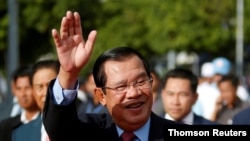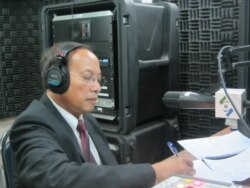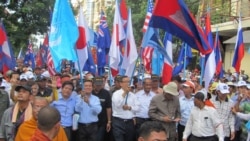U.S. lawmakers have sent a clear signal to Cambodian leaders that they have to reverse course on limiting democracy or face consequences.
“The passage of the Cambodia Democracy Act is an important step toward holding Prime Minister Hun Sen and his cronies accountable for continuing to trample on the rights of the Cambodian people,” said Congressman Steve Chabot, a Republican from Ohio.
Republican Congressman Ted Yoho of Florida introduced the bill in January after Cambodian authorities silenced critics by cracking down on civil society groups, independent media and opposition politicians ahead of the general elections in July 2018.
US action
The U.S. House of Representatives unanimously passed the bipartisan Cambodia Democracy Act of 2019 on Monday. It would freeze assets and restrict visas for Hun Sen’s senior officials, military generals and security officers for undermining democracy and violating human rights.
Cambodia expressed its regret for the passage of the legislation.
“U.S. politicians’ intention on Cambodia always doomed to fail,” government spokesman Phay Siphan told VOA Khmer. “This legislation only aims to destroy democracy that Cambodia continues to strengthen that starts from election rights for the people. Secondly, this legislation aims to destroy efforts to build relationship and cooperation between the two peoples.”
Cambodia’s senate called the bill “an interference into Cambodian affairs.”
Democratic Congressman Alan Lowenthal of California said, “We’ve talked about how unhappy we are with him (Hun Sen) for getting rid of democracy, of keeping under house arrest Kem Sokha and exiling Sam Rainsy.”
Lowenthal continued, “We have spoken out. ... Now, it’s the time to act.”
Yoho said, “This is a step showing that America believes that the people of Cambodia should have democracy. … It’s a step in the right direction to put pressure on the people that are denying them of that. From Hun Sen down to his army generals — the people that are blocking free speech in that country and fair and open elections.”
Further legislative steps
The bill is now in the Senate Foreign Relations Committee. Lawmakers hope the Senate passes it and sends it to President Donald Trump to sign later this year.
“This bill sends a clear message that the United States stands shoulder to shoulder with the people of Cambodia, and that the Congress will hold Cambodia’s leaders accountable for their assault on democracy and violations of human rights,” New York Democratic Congressman Eliot Engel, chairman of the House Foreign Affairs Committee, told the House floor.
After Cambodia’s highest court dissolved the Cambodia National Rescue Party (CNRP), the main opposition, Hun Sen’s Cambodian People’s Party won the 2018 elections, creating what is in effect, a one-party system because the high court also banned 118 officials from politics for five years. CNRP leader Kem Sokha is under house arrest.
“This legislation will revive democracy in Cambodia,” Sam Rainsy, the acting head of the CNRP said of the bill. “This legislation directly puts sanctions on the current Cambodian leaders and family members of the dictator. This legislation won’t affect the living conditions of the Cambodian people.”
Sam Rainsy, who now lives in exile in France, told VOA Khmer that he expects the U.S. legislation will create a stir within Hun Sen’s supporters.
“The pressure is not going to be from the U.S. alone,” Sam Rainsy said. “Once the legislation is enacted the pressure will also come from within the ruling Cambodian People’s Party as well, because some leadership are not happy with what Hun Sen has done to upset the U.S.”
Urging democracy or economic sanctions
The U.S. and the European Union have called on Cambodian leaders to restore democracy or face economic sanctions. The EU is now reviewing the use for Cambodia of its preferential “Everything but Arms” (EBA) trade regime, which allows the world’s poorest countries to sell any goods, except weapons, tariff-free into the bloc.
The 28-member EU is Cambodia’s largest trading partner, and accounted for 45% of its exports worth about $5.5 billion in 2018.
The House also passed the previous version of the bill, H.R. 5754, in July 2018, just days before Cambodia held the general elections, but the Senate did not have time to consider it.
This time around, leaders of the Cambodian American community are vowing to increase their advocacy work on Capitol Hill.
“We have already started working to lobby the Senate’s Foreign Relations to put the legislation on their agenda for the floor vote,” said Pon Saory, secretary general of the Cambodia National Rescue Party Overseas. “It won’t be long before this bill is passed.”







